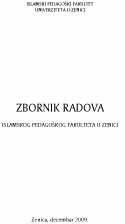MORALNA UVJERENJA I STAVOVI PREMA OBRASCIMA RJEŠAVANJA SUKOBA U SVJETLU TEORIJE DRUŠTVENOG KAPITALA
MORAL BELIEFS AND ATTITUDES TOWARDS PATTERNS OF RESOLVING CONFLICTS IN THE LIGHT OF SOCIAL CAPITAL THEORY
Author(s): Edina Vejo, Nataša Mirolović-VlahSubject(s): Education
Published by: Islamski pedagoški fakultet Univerziteta u Zenici
Keywords: social capital; patterns of resolving conflicts; moral beliefs; students; multicultural; differences
Summary/Abstract: The aim of this paper is to contribute to the understanding of the theoretical construct of a social capital. The social capital is understood as one of the relevant prognostic constructs for the results of both transitional and integrational processes in our societies. Considering that the environment we live in is evident in the process of (re)active religious interest whose basic aim is education in morality, we tried to bring such processes into relation with one of the the basic parameters of social capital. The paper presents the results of comparative research of Zenica and Rijeka students' attitudes towards moral beliefs and patterns of resolving social conflicts. The primary aim of the research was to determine if there were any differences between Zenica and Rijeka students' expressing their attitudes towards moral beliefs resulted from religious concepts and the patterns of resolving social conflicts. The secondary aim was to determine if there was, for students from a certain town, connection between moral beliefs resulted from religious concepts and the ways of expressing their attitudes towards the patterns of resolving social conflicts. Measuring instruments used in the research are: Attitudes according to patterns for solving social conflicts, adapted from Uzelac and Žakman (2000) and Qustionnaire on moral beliefs, adapted from Pajević, i Hasanović (2007). For hypothesis testing we used a t-test, discrimination analysis and Pearson's correlation analysis. The research results have been interpreted in the context of the Kohlberg's theory on moral development and the concept of contemporary theory on resolving conflicts where differences inside a society are welcome.
Journal: Zbornik radova Islamskog pedagoškog fakulteta u Zenici
- Issue Year: 2009
- Issue No: 07
- Page Range: 45-63
- Page Count: 19
- Language: Bosnian

